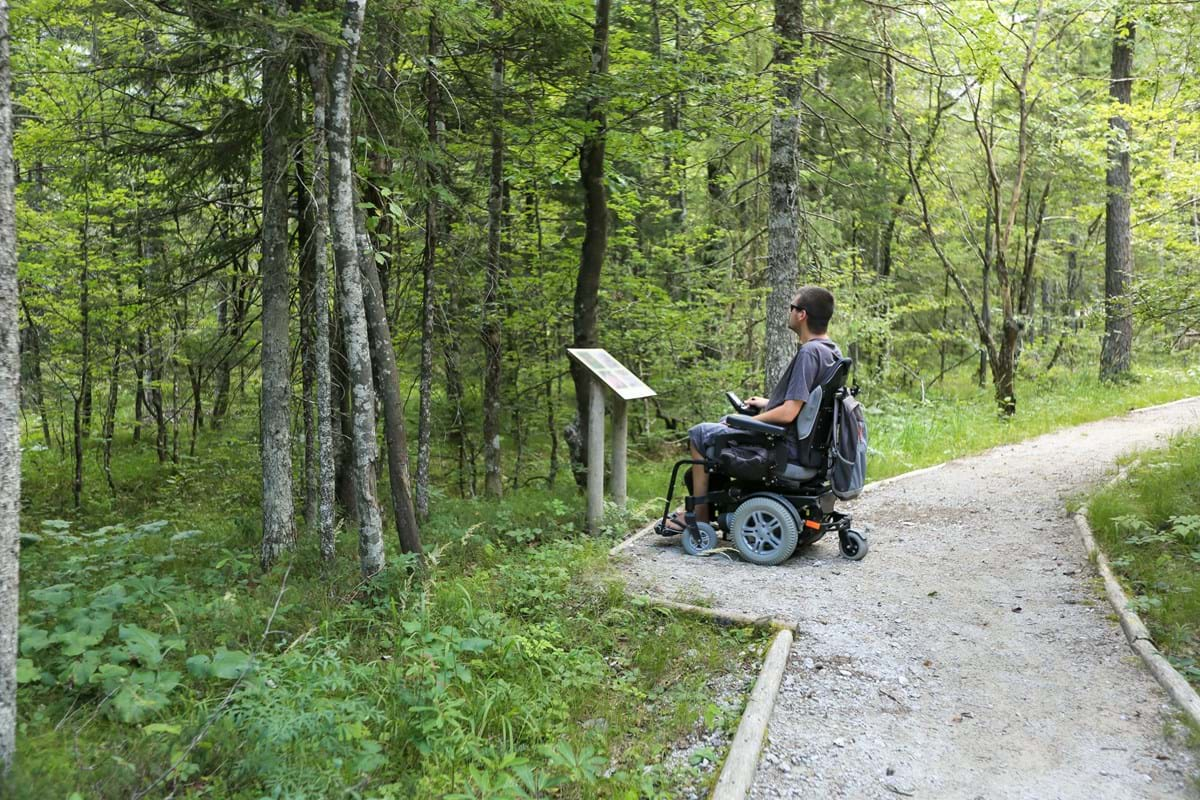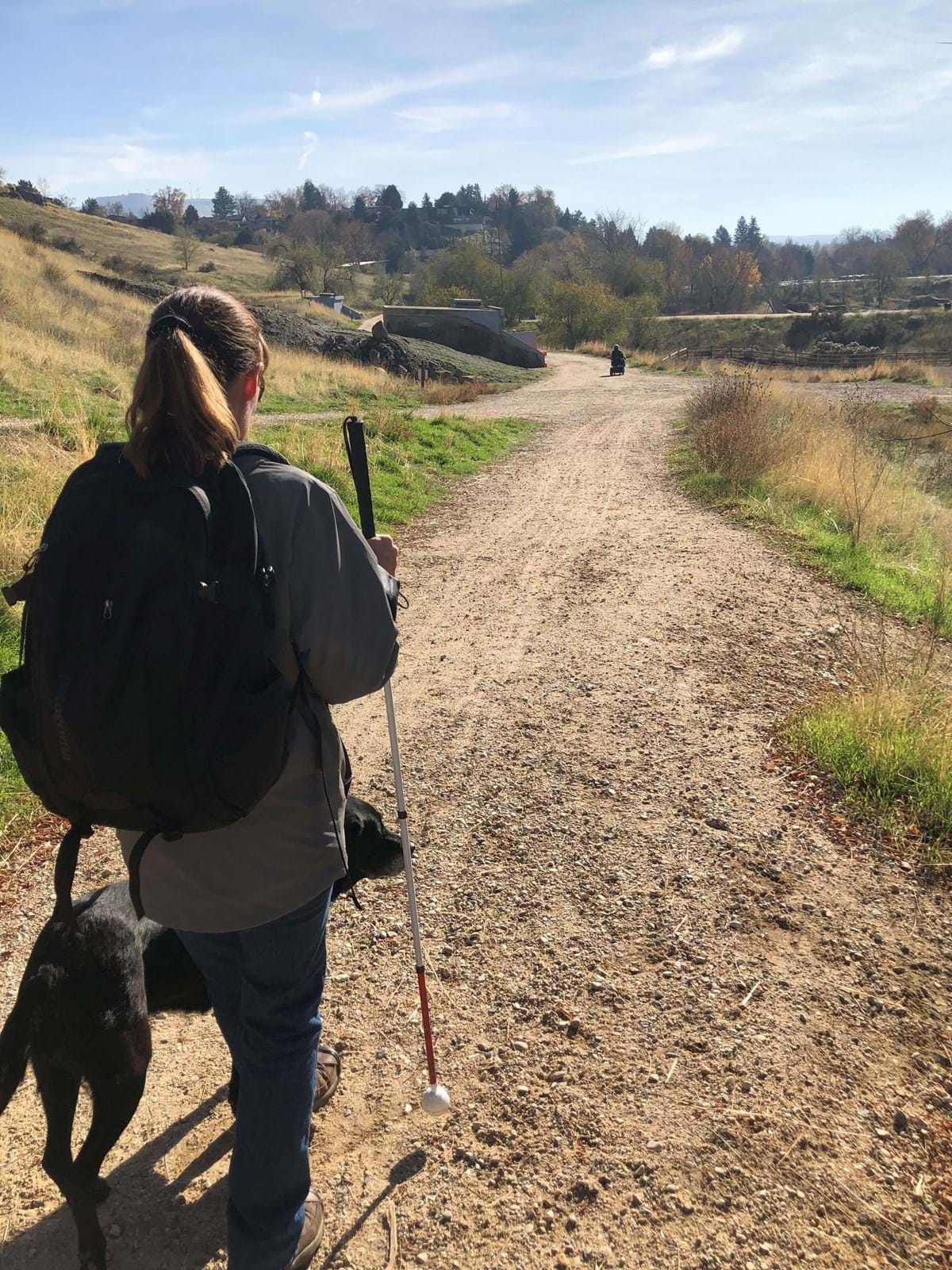In December of 2020, City of Boise staff received a policy brief with a recommendation to convene a Cross Disability Advisory Task Force to build on the work of the ADA Parking Committee and the ADA transition plan working group. The brief outlined the importance of elevating the full experience of a person with a disability living, working, and recreating in Boise beyond legal compliance with the ADA. In response to this brief, city staff built a taskforce comprised of six community leaders with various disabilities to bring forth recommendations to ensure Boise is truly welcoming and accessible for everyone.
Cross Disability Taskforce
Taskforce Members
Dana Gover
ADA Training and Technical Assistance Coordinator and person with a physical disability
Jeremy Maxand
Executive Director, LINC and person with a physical disability
Jen Grush-Dale
Executive Assistant, LINC and person who is a little person
Steven Snow
Executive Director of CDHH and person who is deaf
Dianna Willis
Idaho Access Project President and person who is blind
Carol Baron
ISDB Director of B/VI Outreach and ICBVI ATC Program Manager (retired) and person with low vision and hard of hearing
Recommended Actions
In early 2021, the Cross Disability Advisory Task Force has met weekly over the course of two months. In that time, they developed eight key recommendations for the City of Boise. These recommendations are ranked in order of highest community impact.
1. Enhancing Accessible Transportation
Affordable and accessible taxi and ride share service is non-existent in Boise. Existing options for transportation for those with disabilities are incredibly time consuming: they must be arranged days in advance, operation on Saturdays is restricted with no services on Sundays, and high demand often renders services unavailable. As community members with disabilities, we want to use a taxi or rideshare just like anyone else. This taskforce recommends for the City of Boise to purchase three to five accessible vehicles to be conditionally gifted to Boise taxi companies who would like to partner. Our hope is that once demand for services is more widely understood, more taxi and ride share companies would purchase accessible vehicles on their own and place into service. We feel this is our top priority as this could improve the quality of life for so many.
Due to the COVID-19 Pandemic, the taxi industry saw a significant decline in service. As Boise is still relatively small, most remaining taxi companies are single driver owners and operators. As the pandemic continues, drivers struggle to find enough riders with their existing 4-7 passenger vehicles. They do not feel there is enough business in these current times to justify operating a 2-to-3-person accessible van as their only vehicle. In speaking with local accessible transport companies, they also feel there is not enough business need for after 5 pm services or on-demand services.
As the City of Boise does not have the authority to regulate ride share services or Transportation Network Companies (TNCs), this recommendation would require partnerships with transportation companies such as VRT. The city is continuing to explore potential options and partnerships in the valley. Current City Code does incentivize accessible taxi vehicles by allowing them to operate for 11 years (rather than seven (7) years) before the vehicle must be retired.
2023 Update: Valley Regional Transit (VRT) hosted an “On-Demand Beyond ADA Steering Committee” in the winter of 2023-2024. The goal of this committee was to enhance accessible, on-demand transportation options in the valley. COMPASS, LINC, Central District Health, and community leaders with lived experience met over the course of three months to provide input. The city’s Community Accessibility Manager and a member of this taskforce attended these meetings. As a result of this group, VRT is launching a new service, Beyond Access, in early 2024.
The city will continue to seek opportunities with VRT and other transportation leaders to enhance accessible transportation.
2. Neighborhood Association Interpretation & Accessibility Toolkit
For all community members to have full access to their Neighborhood Association meetings, events, and gatherings, we recommend the City of Boise assist in streamlining resources for effective communication and provide funding to associations for accessibility. Funding would be used for ASL interpretation, materials in braille or large print, etc. We also recommend expanding the existing toolkit for Associations to include other accessibility best practices and information such as people first language, how to fulfill accommodations, how to host an inclusive event or meeting, etc. There is no exact need known for ASL and other accommodations community members need as so many do not request accommodations or go without. In an effort to better understand the amount of need, the city’s Energize Program Manager could potentially pilot a small amount of funding to act as a central source of funds that all Neighborhood Associations can access. This can then be reevaluated in future funding allocations. This taskforce also recognizes the capacity limits of city staff in arranging all accommodations on behalf of Neighborhood Associations. Thus, we recommend the City source accommodations services that offer easy to use services. Additionally, should accommodation requests become frequent, we recommend training association staff on accommodation resources and have them arrange accommodations, while the city continues to provide funding.
2023 Update: The city provides grant opportunities for Neighborhood Associations to support their activities and events. ACT Mini Grants are up to $2500 and can be awarded once per fiscal year. These funds may support communication access for interpreters or materials in alternative formats. Any accommodations request that the association may lack funding for, the city will support funding for equal access. Additionally, these grants can support professional services such as hiring a consultant for guidance to create accessible websites.

3. Standing up the Disability Commission
As many of our recommendations stretch citywide and communitywide, we recommend formalizing this taskforce into a standing body of the City of Boise, titled “The Disability Commission.” This Commission would assist in executing these recommendations and collaborate with and advise city staff on the impact of City of Boise policies, practices, and ordinances to help ensure inclusion, equity, and access for people with disabilities in all aspects of City of Boise operations and community life. We would like to model this commission after the Historic Preservation Committee or Planning and Zoning Commission. This standing body would bring accessibility in a proactive manner as we could provide guidance and partner across city operations such as Parking services, Planning and Development Services, Parks and Recreation department, etc. to best ensure access for all. We recognize that disability and access can touch many programs, buildings, and services. Therefore, we recommend weaving this body into existing processes as well as creating new processes to include access as the city grows while being mindful of time constraints.
2023 Update: Given the vast scope of this proposed commission, the city found it difficult to enact it with success. To achieve its intended purpose, this recommendation has shifted into the “The Disability Committee.” A continuation of this taskforce, this group meets quarterly to discuss current accessibility efforts, advise, and problem solve with staff. Recently the group met with staff to provide input for web accessibility priorities. Future topics that could be brought to this group include: design feedback for rebuilding the pathway intersection at the 9th street pedestrian bridge, a progress update on the city’s ADA Transition Plan, accessible downtown parking garage software, or strategizing additional accessible trails.
4. Pedestrian Pathway Etiquette
As our city grows, we are finding that those without disabilities are unaware of best practices and etiquette for sharing a pedestrian pathway with those with disabilities. As our downtown dining and entertainment becomes more popular, the accessibility of pedestrian pathways, such as sidewalks, is becoming increasingly difficult or impossible for us to navigate. On trails, including the Greenbelt, we frequently encounter bicyclists and scooters passing at high speed and people who don’t understand that people using a wheelchair, white cane, or guide dog may need to travel, at times, in the middle of the path due to uneven terrain. This taskforce recommends working with City staff to create education and awareness materials to distribute to the community and businesses. These materials would educate people without disabilities about the importance of barrier-free sidewalks, disability etiquette, and how things such as scooters, bikes, or patio chairs can negatively impact those with disabilities as we try to equally enjoy our downtown and shared pathways.
2023 Update: A social media campaign was launched in summer of 2022 to help expand education on pathway etiquette. Two members of this taskforce provided insights and tips for how the community can work together to provide safe and equal access for everyone. The campaign’s focus was for the Greenbelt, a popular and extensive pathway system, but was applicable to any pathway. These videos received tremendously positive feedback and were widely shared.
Sidewalk obstructions are frequently brought to the city to remedy. Depending on location, sidewalks may be governed by the city or Ada County Highway District (ACHD). City staff created a website on its ADA page, providing reporting instructions so barriers can be remedied more swiftly.
To celebrate White Cane Day and highlight pedestrian safety, the social media team worked with the Idaho Commission for the Blind and Visually Impaired (ICBVI) in October 2023. Someone who uses a white cane was interviewed about the importance of the white cane as a mobility aide and etiquette when assisting someone. The city continues to explore partnerships and opportunities to support barrier-free and safe pathways.

5. Zoning Code Rewrite & Access Prioritization
The city’s PDS team is currently revising Boise’s zoning code. For people with disabilities, revisions such as “Do Not Block” painting on the access aisle of accessible parking stalls, required clear width of sidewalks, and placement guidelines of bike racks are vital for maintaining equal access. This taskforce recommends reviewing zoning code revisions with city staff to ensure accessibility is included in design and development standards before codes are finalized. Our ask is to prioritize accessibility in new codes to bring consistency in design and streetscapes for all builds, remodels, and designs. We see too often accessibility as an afterthought and builders look to the city for guidance and regulations for enforcement. We would like to have codes ensure accessibility so enforcement and new builds can be streamlined and aligned for accessibility. City staff have coordinated working sessions with this taskforce to review and make recommendations to the zoning code revisions as part of the community engagement period of this project.
2023 Update: The PDS team met with this taskforce twice during the course of writing the Modern Zoning Code. Staff presented goals, timelines, priorities and specific changes regarding accessibility. Taskforce members provided feedback during and after both discussions with the PDS team. As a result of these discussions, several changes were made, including:
- All sidewalks will now be a minimum of 5-feet in width of clear space. In many cases, sidewalks will be wider.
- All sidewalks and pathways are required to be constructed with asphalt or concrete to provide surfaces that are appropriate for all ages and abilities.
- Door swings will not be allowed to swing out within the public sidewalk.
- All amenities are required to be accessible to all.
- Created a process to request “reasonable accommodation.”
6. Trail Accessibility
For people with disabilities, a simple hike on Ridge to Rivers trail requires significant research beforehand to locate an accessible trail, determine if the trailhead has accessible parking and restrooms, ensure obstacles such as a closed gate are not present, make sure the trail is wide enough, has cell coverage for adaptive technology, determine their level of comfort with all user trails vs. pedestrian only, if the trail is near a route with accessible transportation, and adequate surface material for wheelchair use. A common misconception is that for trails to be accessible they need to be paved. This is not our ask nor goal. This taskforce recommends partnering with city staff and fellow organizations of the Ridge to Rivers partnership to make fully accessible trail and trailhead options so we may recreate equally. A significant barrier to trail accessibility is that the Ridge to Rivers website isn’t fully accessible or intuitive to use. As research prior to hitting a trail is critical for an enjoyable experience, we recommend reworking the “Accessible Trails” page of the Ridge to Rivers website to give more detail of the trail options, location of trails, placement of accessible parking, etc. for easier planning.
2023 Update: In June 2023, a new, fully accessible trail was built. This trail, Grove Trail #38 Loop, is approximately .64 miles in Hulls Gulch Reserve. This location was selected due to its abundance of shade, its proximity to a near by creek, ability to connect to other trails and amenities. Two accessible parking stalls were also paved at two trail heads so users can more easily explore existing accessible trails. Lastly, the Ridge to Rivers website that listed accessible trails was revised to provide additional detail like maximum cross slope and grade, minimum widths, and other specific information hikers might need. This revised website was tested by users with disabilities.

7. Community Accessibility Webpage
The COVID-19 pandemic has highlighted the importance and value of our parks, recreation opportunities and community events sponsored by the City of Boise. However, for people with disabilities, it can be difficult and time consuming to find information on where to enjoy an accessible park or which trailhead would be most accessible for them. Therefore, this taskforce recommends the City of Boise create an accessible webpage to act as a hub for all things accessibility so community members and visitors can play, work, and recreate equally. This website could house information on accessible features at parks, accessibility resources in the Treasure Valley, clubs and organizations such as Deaf Grayhairs (a social club for deaf and hard of hearing community members), AdVenture programming, etc. to spread awareness of resources and build community.
2023 Update: Parks and Recreation created a website Accessible Recreation to house the city’s plethora of opportunities for people of all ages and abilities to explore, recreate and play. This site lists playgrounds with accessible equipment and bonded rubber surfacing, accessible paths and features, accessible park shelters, accessible sport courts, and accessible trails. This website will evolve as new features and amenities are added by the city.
8. Staff Trainings
Awareness and education are important aspects of building a City for Everyone and a welcoming environment. Therefore, this taskforce recommends training for city staff. Members of this taskforce are connected to organizations such as, the Council for the Deaf and Hard of Hearing (CDHH) and the NW ADA Center-Idaho and could design specific trainings to further the city’s internal culture of inclusion. Trainings could include how to work with an interpreter, Emergency American Sign Language (ASL) for our emergency responders, disability etiquette, ADA regulations, a disability panel discussion to have meaningful discussions with staff regarding accessibility, etc.
2023 Update: In October 2023, four members of this taskforce volunteered to help create five staff training videos. These videos consisted of lived experience interviews to be more meaningful rather than from a purely legal perspective. Video topics include Inclusion & Access, Equal Access, Effective Communications, People First Language and Disability Etiquette. These videos will be an onboarding requirement for all new staff and again biennially (every two years). These trainings will be assigned to employees beginning in early 2024.
The Disability Commission
The Disability Commission would help the City of Boise build on its commitment to Creating a City for Everyone, and work towards a broader vision for access and equity. We recommend folding the work of the ADA Parking Committee into this new commission, which would be comprised mainly of people with various disabilities. It is important for this committee to have the majority of members be people with disabilities, as we can offer the most insight and perspective.
In addition to continuing work on our recommendations, this Commission would like to:
- Serve as an advisory body for internal initiatives, programs, and buildings so they are inclusive and accessible.
- Collaborate with the City of Boise and other partner entities on new developments, streetscapes, resigns, bike paths, and pedestrian pathways to ensure accessibility.
- Advise the Community Accessibility Manager on priorities, issues of concern, and help strategize innovative solutions.
We would like to acknowledge that our current membership is not fully representative of our community members with disabilities. Should this Commission be approved, it is our goal to actively recruit an additional member with an intellectual or developmental disability. We feel it is important to be intentional about our representation and have at least one member with intellectual or developmental disability as they are too often not included.
PURPOSE: The Disability Commission (DC) advises and assists the Mayor, City Council, and City departments to realize the full participation of people with disabilities in all areas of economic, political, and community life in the City of Boise.
MISSION: To create an inclusive Boise by addressing access barriers, raising awareness, and bridging communities.
VISION: We envision a city that is accessible, inclusive, and equitable for people with disabilities.
Timeline of Recommendations
| Timeline | Recommendation | Status |
| Short Term (0-6 months) |
|
|
| Mid-Term (6-1 year) |
|
|
| Long Term (1-3 years) |
|
|
Send a Message to Community Engagement
Thank you for your interest in the City of Boise's Office of Community Engagement. Please use the form below to reach out to our team.